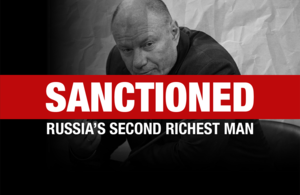UK sanctions Russia’s second richest man
The UK government has today announced new sanctions, hitting Putin’s inner circle.

- oligarch Vladimir Potanin, Russia’s second richest man and key supporter of the Kremlin, sanctioned
- Anna Tsivileva, Putin’s first cousin once removed and president of major Russian company, also sanctioned
- new measures ensure that oligarchs cannot use UK trusts services
The UK government has today (Wednesday 29 June) announced new sanctions, hitting Putin’s inner circle.
Amongst those sanctioned is Vladimir Potanin – Russia’s second richest man and owner of major conglomerate Interros. Potanin continues to amass wealth as he supports Putin’s regime, acquiring Rosbank, and shares in Tinkoff Bank in the period since Russia’s invasion of Ukraine.
Anna Tsivileva, Putin’s first cousin one removed and President of the prominent Russian coal mining company, JSC Kolmar Group, has also been sanctioned. Tsivileva’s husband Sergey Tsivilev is Governor of the coal rich Kemerovo region and the couple have significantly benefitted from their relationship to Putin. JSC Kolmar Group is also being sanctioned today.
A government spokesperson said:
As long as Putin continues his abhorrent assault on Ukraine, we will use sanctions to weaken the Russian war machine. Today’s sanctions show that nothing and no one is off the table, including Putin’s inner circle.
The UK government is also sanctioning a group of Russian individuals and companies for their involvement in repressing civilians and supporting the Assad regime in Syria – exposing Russia’s malign activity across the globe.
The UK government is also acting alongside international allies to introduce new measures that will prevent Russia from accessing UK trusts services. These services, which allow a person or business to manage the assets of another, are another major element of the UK’s world-class financial services sector that Russia will no longer be able to use.
Throughout Putin’s war of choice, international partners have stood side by side with Ukraine and used sanctions to punish his abhorrent invasion and Governments and businesses alike are turning their backs on Russia. The UK has sanctioned more than 1,000 people and over 100 businesses since Putin’s invasion of Ukraine and 3 quarters of foreign companies have reduced operations in Russia – nearly a quarter of which have completely withdrawn.
Russian imports have dropped over 40% since the invasion and stockpiles of vital imported manufacturing components are likely to be depleted in the next 3 to 6 months.
Car production is also down by 60% and Russia’s own Transport Minister has admitted that Russia’s logistical infrastructure is now “broken” as a result of sanctions.
View the full UK sanctions list.
Background
Asset freeze
An asset freeze prevents any UK citizen, or any business in the UK, from dealing with any funds or economic resources which are owned, held or controlled by the designated person. UK financial sanctions apply to all persons within the territory and territorial sea of the UK and to all UK persons, wherever they are in the world. It also prevents funds or economic resources being provided to or for the benefit of the designated person.
Travel ban
A travel ban means that the designated person must be refused leave to enter or to remain in the United Kingdom, providing the individual is an excluded person under section 8B of the Immigration Act 1971.
Transport sanctions
Recently introduced powers make it a criminal offence for any Russian aircraft to fly or land in the UK, and give the government powers to remove aircraft belonging to designated Russian individuals and entities from the UK aircraft register, even if the sanctioned individual is not on board. Russian ships are also banned from UK ports.
Media enquiries
Email newsdesk@fcdo.gov.uk
Telephone 020 7008 3100
Contact the FCDO Communication Team via email (monitored 24 hours a day) in the first instance, and we will respond as soon as possible.